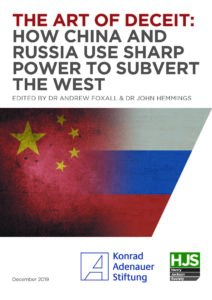 In the wake of the Biden administration’s Summit for Democracy, a formal Alliance of Democracies would provide a highly visible platform for fostering solidarity in the face of common threats and challenges, argue Ash Jain, director for democratic order at the Atlantic Council, and Jonas Parello-Plesner, executive director of the Copenhagen-based Alliance of Democracies Foundation:
In the wake of the Biden administration’s Summit for Democracy, a formal Alliance of Democracies would provide a highly visible platform for fostering solidarity in the face of common threats and challenges, argue Ash Jain, director for democratic order at the Atlantic Council, and Jonas Parello-Plesner, executive director of the Copenhagen-based Alliance of Democracies Foundation:
- The leading democracies in North America, Europe and the Indo-Pacific make up roughly three-quarters of global gross domestic product.
- In combination with the European Union, the transatlantic partnership provides nearly 80 percent of official developmental aid worldwide.
- And the 20 highest scoring countries in terms of soft-power influence are all democracies.
These assets provide the United States and its allies with an enormous source of leverage. But the Alliance of Democracies must be more than symbolic and be prepared to address the three defining challenges facing the democratic world, they write for The Hill:
 The first is the increasing assertiveness by China and Russia to make the world safer from autocracy. …In response, the alliance could facilitate coordinated sanctions and other measures to deter such behavior, and provide a mechanism to provide joint assistance to targeted democracies. It could also help make democracies less vulnerable to economic coercion, including, for example, by facilitating alternative supply chains for sensitive technologies and critical energy supplies.
The first is the increasing assertiveness by China and Russia to make the world safer from autocracy. …In response, the alliance could facilitate coordinated sanctions and other measures to deter such behavior, and provide a mechanism to provide joint assistance to targeted democracies. It could also help make democracies less vulnerable to economic coercion, including, for example, by facilitating alternative supply chains for sensitive technologies and critical energy supplies.- The second is backsliding within established democracies. …. The alliance can serve as a mechanism to hold states accountable for their democratic practices at home. Building on the loose pledge system for leaders’ interventions at the Summit for Democracy, countries could be asked to make specific commitments to advance democratic renewal at home as part of their alliance membership obligations.
- The third is the rise of emerging and potentially disruptive technologies. Such technologies — including artificial intelligence, quantum computing, genetic engineering and 5G — are developing rapidly and will significantly shape the future of geopolitics. While these innovations promise great benefits, they also carry serious risks, including security challenges. If China or other autocratic nations succeed in developing these technologies ahead of the democratic world, they could gain significant economic and military advantages. To counter this, the alliance should set common standards for advanced technologies that are consistent with liberal norms.

Alliance of democracies
The need for democracies to cooperate and coordinate globally to impose human rights and economic sanctions, in international forums and to uphold multilateral rules, and on strategic and security issues is increasingly recognized, and attempts to build coalitions of democracies are nothing new, the European Parliamentary Research Service (EPRS) observes.
The idea of an alliance of democratic states has deep historical conceptual roots. There have been prior attempts to bring democratic alliances to life, but to date these remain limited either in membership or objectives, it adds, citing the Community of Democracies (CoD) and its ambitious strategic plan to respond to democratic backsliding and shrinking civic space. Experts have also suggested transforming the G7 into a D10 global steering group, including Australia, South Korea, and possibly India (all invited as guests to the most recent G7 Summit). RTWT
With the support of @NEDemocracy, @NDI @IRIglobal & @CIPEglobal are collaborating to map global, inclusive, citizen-centric visions for a high-tech democracy by 2030 that can out-inspire out-govern digital authoritarianism @MaddyNicoloff writes https://t.co/bmc10SFfYE
— Democracy Digest (@demdigest) December 21, 2021







